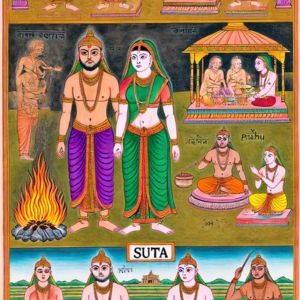DASI-SUTA Ask Bidara (Vidura), Dasi-Suta (the son of the maid-servant), in whose house Krishna stayed. (Suhi M. 4, p. 733) The words Dasi-Suta mean the son of a maid-servant. These words are used with reference to Vidura, the half-brother of Dhritarashtra and Pandu. When Vichitra-virya, the son of Shantanu passed away without any issue, two sons were bom to his widows Ambika and Ambalika through Niyoga with Vyasa in order to continue the royal line.
These sons were Dhritarashtra, who was blind and Pandu, the pale one. It was considered desirable to have another son -who should be \’without any defect. This time the widow sent her maid-servant in her clothes and Vidura •was bom. That is the reason for using the epithet Dasi-Suta for Vidura. See : Vyasa , Vidura .
References :
1. Kohli, Surindar Singh (ed), Dictionary of Mythological References in Guru Granth Sahib, 1993
In Hindu mythology, Vidura, famously known as the Dasi-Suta (son of a maid-servant), was the half-brother of Dhritarashtra and Pandu. His story emerges from the events following Vichitravirya’s death, when Queen Satyavati summoned Sage Vyasa to perform Niyoga (a practice where an appointed man fathers children with a widow to continue the lineage). The queens, Ambika and Ambalika, hesitated due to Vyasa’s austere appearance, leading to imperfect results. However, a maid-servant who served Vyasa humbly bore Vidura, who was born wise, virtuous, and filled with dharma. Although Vidura was not eligible for the throne due to his birth status, he became the chief advisor in the Kuru court, renowned for his integrity and sagacity.
Vidura played a vital role in the Mahabharata. He often opposed Duryodhana’s unjust actions and warned Dhritarashtra of the consequences. His wisdom is compiled in the Vidura Neeti, a treatise on morality, governance, and justice. Vidura represents the triumph of character over lineage, and his life offers profound lessons on righteousness.






